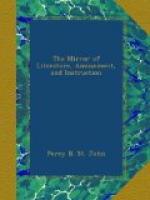Then tie on your bonnet, your shawl,
and your boa,
And with war-cry of “Hyson-dust!”
onward with me;
Come, brandish your tea-spoons, ye maids who adore
The flavour of Twankay, Souchong, or Bohea!
Monthly Magazine.
[25] We are aware that this rhyme
is rather unusual; but we may
parody the maxim of Sir Lucius—“When
patriotism guides the
pen, he must be a brute that would find fault
with the rhyme.”
* * * * *
USEFUL DOMESTIC HINTS.
* * * * *
ECONOMIC HINTS.
Box-wood as a substitute for Hops.—M. Du Petit Thouars lately stated to the Philomathic Society of Paris, that more box-wood than hops was employed in making almost all the beer brewed in Paris. Box-wood contains a powerful sodorific principle with a bitter taste, which has lately been separated, and is now known under the name of Buxinia.—Bull. Un.
Receipt for making Grape Wine, used in 1819.—Water, 4-3/4 gallons, beer measure; grapes, 5 gallons, beer measure, crushed and soaked in the water seven days; sugar, 17-1/2 lbs. at 10-3/4_d_. The sugar came to 15_s_. 8-1/2_d_.; and the grapes to perhaps 5_s_. The cask in which it was made held exactly 6-3/4 gallons, of beer measure, and produced 34 bottles of wine clear. A bottle of the above wine, kept ten years, proved very good.
Wine from the common Bramble.—Five measures of the ripe fruit, with one of honey and six of water, boiled, strained, and left to ferment, then boiled again, and put in casks to ferment, are said to produce an excellent wine. In France the colour of wine is often rendered darker by a mixture of blackberries with the grapes.—Recueil Industriel.
Receipt for making Tomato Sauce.—Take tomatoes when ripe, and bake them till they become quite soft; then scoop them out with a tea-spoon, and rub the pulp through a sieve. To the pulp put as much Chile vinegar as will bring it to a proper thickness, with salt to your taste. Add to every quart 1/2 oz. of garlic and 1 oz. of shallots, both sliced very thin. Boil it one quarter of an hour; then strain, and take out the garlic and shallots. After standing till quite cold, put the sauce into stone bottles, and let it stand a few days before it is corked up. If, when the bottles are open, the sauce should appear to be in a fermenting state, put some more salt and boil it over again. The sauce should be the thickness of rich cream when poured out, and is, in my opinion, far superior to the famed Bengal chattny, to which it bears considerable resemblance.
Economical Fuel.—A good fire on a winter day, at a mere trifling expense, is of importance to a poor man. One pennyworth of tar or rosin water will saturate a tub of coals with triple its original quantity of bitumen (the principle of heat and light), and, of course, render one such tub of three times more value than it was when unsaturated.




